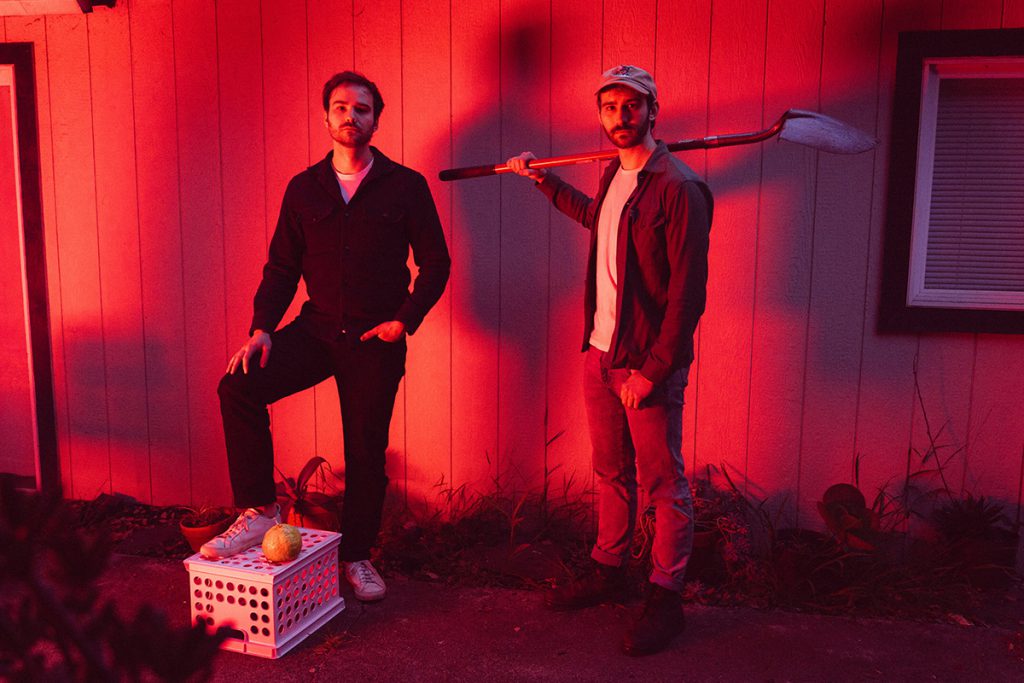Interview: Oakland’s Super Cassette finds the right tech for its message

Super Cassette: Max Gerlock (L) and Nick Gerlock. Courtesy Gene Ang.
OAKLAND — Pop outfit Super Cassette sings about moving through darkness rather than dwelling in it.
Continue?
Super Cassette
Dad Shirt Records, out now
Get the album on Amazon Music.
“Even in the more depressive songs, there’s a sense of pushing through difficulties and a desire to exist and be happy,” says Max Gerlock, one half of the Oakland duo.
Gerlock, the singer, songwriter and guitarist, is sitting on one of the couches and sipping from a water bottle at the back of a dimly lit Lake-Merritt-adjacent bar Room 389 a couple of days before Christmas, as jazzy music plays through the speakers. Gerlock is wearing Super Cassette merch.
“Wearing your own merch might seem cringe,” says Gerlock, who uses they/them pronouns. “But it’s genuinely comfortable! We went for nice hoodies, and I have to admit, they’re great.”
Super Cassette started as a solo project, Maximillian, in 2016. Gerlock, who worked a monotonous job in Silicon Valley after earning a degree in electrical engineering and computer science at UC Berkeley, burned out and refocused on music. After releasing several songs, they wanted to play them live. So they recruited their brother, Nick Gerlock (guitar). The band includes bassist Devon Hollister and drummer David Rabkin.
Streamer Bandcamp soon let the Gerlocks know there was already another artist who used the same Maximillian monicker and had requested their music be taken down due to copyright infringement.
Gerlock created a list of potential replacement names that focused on obsolete tech products. That’s when they settled on Super Cassette. The name comes from a Japanese video game console from the mid-’80s called the Secret Cassette Vision. Clearly, their education and outside interests still influenced their music.
Then, during lockdowns in 2020, single “Be Gay, Do Drugs, Hail Satan”—a declaration of self-worth—began to resonate online with several million streams on Spotify and other platforms. Gerlock, Super Casette’s primary songwriter, says they view lyricism as an exercise in vulnerability and an attempt to be fully honest with themself.
“Sometimes, lines that I consider cringe end up resonating the most with others,” they say. “It reminds me of what Thom Yorke said about the parts you want to cover up being the ones people want to see the most.”
Super Cassette pull from bands like the Strokes, Beach House, Radiohead, Green Day for inspiration. More modern influences include Jeff Rosenstock (“just rad as hell”) and Alvvays, who Gerlock sees as a contemporary blueprint for good jangle pop.
The Gerlock brothers grew up in rural Southern California, about halfway between Riverside and San Diego. They were homeschooled before they got to public high school, where Max had a difficult time starting out. But music was an outlet, and max played both guitar and alto saxophone. They started bringing their guitar to play in school.
“I built my identity around it,” they say. “Playing ‘High and Dry’ by Radiohead in an English class performance with a friend sparked the realization that I could perform for an audience and get a positive reaction. I think that was probably when I kind of got the bug.”
For its debut album, December’s Continue?, Super Cassette tapped producer and engineer Cole Williams to make it feel fuller than its solo project origins.
“Working with Cole really helped me grasp what a good arrangement looks like,” Gerlock says. “Having someone else to help with editing has allowed the arrangements to get more exposed and indirect in a way that I think makes the songs better.”
The band debuted several catchy tunes with earworm guitar solos at an album release show at Bottom of the Hill in San Francisco.
“Nick, our guitarist, has been shredding for a long time.” Gerlock says. “During some tours, I took on the guitar solos, which was initially scary but fun as I gradually learned all the parts. So, there’s something for everyone; catchy tunes and moments of interesting musicianship.
“In the song ‘Bones,’ there’s a high note before the last chorus where the band cuts out, leaving the note exposed,” they continue. “It creates a powerful moment. Also, in the intro of ‘Do Drugs Hail Satan,’ we’ve started stretching out the intro and teasing the audience a little bit. It’s amazing how a packed room can become so silent. We could play two chords and then stop and you could hear a pin drop.”
